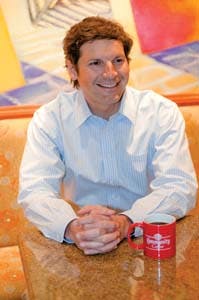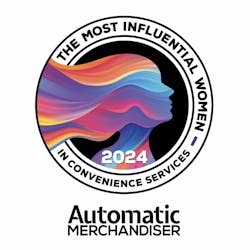In the South, tradition holds a lot of sway in how people live and how they do business. Southerners have always been passionate about coffee, and service providers that understand this have prospered.
In the South, dedicated coffee players still control much of the market.
And while change is coming on many fronts in the South — single-cup brewing systems are currently making headway — dominant coffee players such as Baton Rouge, La.-based Community Coffee Co. continue to expand.
Community Coffee Co. is an importer and roaster with a sales structure that includes a grocery retail and a multi-channel coffee service division, serving eight states. They also serve customers on a national level through e-commerce and a national accounts program. With its 91-year tradition, the company, under the fourth generation of the founding Saurage family, continues to grow from Florida and Georgia on the east to Texas on the west.
OCS emerges as a specialty
The economy has been as challenging in the South as anywhere else, but in recent years, OCS has become a specialty unto itself, and companies that have demonstrated expertise are winning market share.
The “specialization fosters perfection” principle holds true for many accounts, as evidenced by Community’s continued growth despite the recession
No doubt, being an importer, roaster, retailer and OCS provider offers unique synergies to Community, both in operations (production, accounting, administrative) and marketing.
Being an importer, Community has complete quality control of the quality of its coffee.
Arabica beans imported from farms worldwide are roasted in a modern roasting plant in Baton Rouge, La., then shipped in company vehicles to 21 sales and distribution locations.
The company uses a variety of vehicles to get its product to market. Route sales employees use handheld computers with custom designed accounting software to respond to demand and to ensure adequate inventory and pricing.
Marketing synergies are as powerful as operational ones.
When a Community salesperson calls on an office manager, that potential customer has most likely seen if not purchased the company’s coffee at a CC’s Community Coffee House location, on the Internet or at local supermarkets. Marketing and advertising supports all four of the company’s divisions.
“We were drawn into the foodservice and office channels by our customers,” noted Matt Saurage, the current president and great grandson of founder Henry Norman “Cap” Saurage. “Our customers who make buying decisions in restaurants and offices are also our customers in the grocery store.”
And while steeped in tradition, the company has invested in new technologies that build efficiencies and strengthen marketing. The company has had an Internet presence since 1994 which is one of its fastest growing areas. It has also achieved a major following on Facebook.
A leader for a new era
Saurage, 40, assumed leadership of the company five years ago. He worked in a number of positions at the company since his teens and earned an undergraduate degree in engineering at Louisiana Tech University in Ruston, La. and a master’s degree in business administration at Vanderbilt University in Nashville, Tenn.
His leadership has come at a critical time, beginning with hurricanes Katrina and Rita, which struck
Louisiana in 2005. The hurricanes were followed by the recession, which further challenged the company.
The past five years also marked shifts in consumer behavior as well as evolving products and equipment.
Saurage learned the importance of quality and dedication to the customer at an early age. He remembers when a Brazilian freeze sent coffee prices soaring in the 1970s. For a brief period, the company lost money on every pack of coffee it sold. “Even at a loss, we felt it was important to maintain quality at an affordable price for the customer,” he said.
The Brazilian coffee freeze provided a valuable lesson. Community has established relationships with a variety of coffee sources to help minimize the risk of disruption of its supply chain and ensure a safe, high quality product supply.
Saurage has been a member of the Specialty Coffee Association of America (SCAA) and an advocate of the SCAA’s Golden Cup Award.
While the company is organized into four different business units — grocery, coffee houses, on-premises (foodservice, offices and convenience stores) and Internet — Saurage points to the common thread: serving the consumer.
While Community uses a variety of distribution methods, its sales function is simplified by a focus on one brand of coffee: Community. The company’s mission is for Community products to be known as the best quality available, Saurage said. This includes not just coffee, but also tea, sweeteners, mugs, brewers, cups and other coffee essentials.
What sells in coffee shops, supermarkets and restaurants also sells in offices and convenience stores: consistent quality. Recent growth areas include iced coffee, iced tea, hot tea, hot cocoa and filtered water.
Saurage believes the coffee consumer is better educated about coffee than ever before, and is more demanding, a situation that he views as an opportunity. “The consumer is always smarter than we expect them to be,” Saurage said. Community provides ongoing coffee education for all employees and customers.
Employee education continues
For all new employees, Community sponsors “My First Cup,” a 4-day training course in the Baton Rouge headquarters that covers all aspects of the business: operations, roasting basics, cupping, driving and sales skills. Sales personnel undergo additional training. All employees are expected to be “brand ambassadors.”
While there are account executives whose main responsibility is sales and account retention, all Community representatives are expected to prospect and to “upsell.” Even service technicians are expected to educate customers about the range of products available.
The company compensates its dedicated sales people based on growth, retention and customer feedback.
Customer education is key to the company’s marketing efforts. Community was quick to recognize the Internet’s strength as an education tool. For instance, all customers can go to the company’s Website and access a chart listing nutrition ingredients for its 12 top-selling coffeehouse drinks.
Delivery systems vary
Community’s on-premise division uses a variety of delivery models due to the large geographic territory covered. Population-dense markets such as Houston, Dallas and Atlanta are serviced on a pre-sell system while in rural areas, orders are taken by the route sales employees.
The recession has affected sales for all types of customers, Saurage said. The restaurants have been faster to respond with better quality coffee than offices and convenience stores, and as a result, they are recovering faster. Many restaurants advertise Community’s SCAA Golden Cup designation on their menus.
Community’s customer mix varies by route. Some routes almost entirely serve offices while others serve mostly restaurants. Most serve a mix of offices, restaurants and convenience stores.
Saurage said offices and convenience stores are more affected by employment patterns than restaurants. Hence, these customers haven’t recovered as quickly from the current recession.
Satisfying customers requires communication, Saurage noted. For the office segment, this is especially challenging since there are more decision makers to address.
Offices still want quality products
Offices are looking to economize, Saurage said. But they are not interested in compromising on quality. Hence, Community sales reps review the equipment being used, the variety ordered, and the inventory stored. “There are many ways to economize,” Saurage said. “You have to stop and listen and solve problems.”
Among convenience stores, Saurage has noticed those that have responded with design upgrades and better quality coffee have recovered faster than those that haven’t. He said his customers are more discriminating coffee consumers than ever before.
Higher expectations extend to the workplace as well. Working adults today want more from their employers. “The expectations are higher,” he said. This requires service providers to have better products and better trained employees.
This development bodes well for companies that have invested in the best quality products and equipment.
The company’s standard OCS kit consists of 2.6- and 3-ounce fraction packs of its 100 percent Arabica coffees served in glass bowl, automatic drip brewers and other types of equipment.
OCS: single-cup emerges
Southern consumers in general have been more hesitant than other regions to accept single-cup brewers. Under Saurage’s leadership, Community was one of the first to offering single-cup in many of its markets.
Saurage was aware of single-cup systems when they began to take hold in the U.S. in the 1990s. He studied all of the available equipment. He recognized the speed and convenience these systems offered, but he was not convinced of the reliability of many of the early units.
He felt the hopper-based single-cup systems were more complex and offered limited variety. Meanwhile, the capsule-based systems offered more variety, but generally they were in a proprietary format owned by the roasters. This format does not suit Community, which roasts and packages all of its own coffee. “We needed a solution that would allow us to control the quality and brand ourselves,” Saurage said.
The “soft pod” brewers, which emerged after the proprietary capsule models, have offered a good alternative. The manual pod brewer offers the convenience of the capsule system but it also accommodates a private label coffee pod. “Pods give us the ability to control all aspects of the blend, grind and profile,” Saurage said.
Pod brewers have been marketed as an economical alternative to systems that use proprietary capsules. Many operators questioned the reliability of manual pod brewers when they were introduced. But as the equipment evolved, more operators noted the systems became more reliable.
OCS operators remain divided on the reliability of pod brewers at present.
In 2005, Community opted to use a pod brewer and package its own branded coffee pods. The company packages pods for regular coffee, origin of country blends and tea.
Community introduced pod brewers to complement the more traditional automatic drip brewers in offices.
“Once a pod brewer is in place, it stays,” Saurage said. “It’s definitely an affordable solution for them. We’ve had good success with pods.”
Single-cup growth has been slow in most markets Community serves, but it has been gaining momentum, Saurage said. Single-cup brewers make the most sense in accounts that host clients or have a lot of afternoon coffee drinkers, he said. “Customers are not leaving drip coffee for single-cup. They see single-cup as a complement to their coffee service,” he said.
The company has also sold its pods in supermarkets, but the growth has been slower in this channel due to the limited availability of reliable pod brewers for the home, Saurage said.
Community uses mostly glass bowl automatic drip brewers in offices, as opposed to thermal servers or airpot brewers. In addition to being more visually appealing to customers, the aroma emanating from the glass pot is another draw, Saurage said. “Glass bowls work well in an office environment,” he said.
Community’s OCS portfolio includes a variety of coffees, teas, hot cocoa, cappuccinos and coffee-affiliated products such as creamers and flavored syrups. The company also provides packaged cold beverages and point-of-use water assurance systems.
Key advantage: professional marketing
One of the most significant economies of scale that a large company enjoys in OCS is a professional marketing program. Community’s marketing team includes a full-time marketing vice president, an on-premise brand manager, and a staff that oversees public relations, creative services, media advertising, promotions, field marketing and social media.
“It’s good for a brand to have an image, and customers love to participate in that image,” Saurage said.
Earlier this year, “Every Day with Rachael Ray” magazine selected Community New Orleans Blend® Coffee and Chicory as its “Best Flavored” coffee. The magazine singled out Community New Orleans Blend® in a taste test as part of the “Supermarket 101 feature” in the March 2010 issue.
Community outreach continues
Community has also enhanced its visibility through various community outreach programs.
One of the oldest is the “Community Cash for Schools” program, whereby schools earn money by collecting bar codes from Community brand products in exchange for a cash donation.
Students, parents and teachers, as well as restaurants and businesses, collect bar code labels for the schools. The schools can use the money any way they see fit. Since the program’s inception in 1989, schools have earned a total of about $4.5 million.
While Community’s operations have not been hurt by the recent Gulf oil spill, hurricanes in recent years have damaged customer facilities.
During hurricanes Katrina and Rita, Community trucks rode through hurricane-affected neighborhoods in New Orleans, offering free coffee, tea and water to residents and construction crews.
Current focus: Organic growth
The company’s current focus is to build its density in existing markets. While Community has expanded to new geographic areas through acquisition in the last decade, Saurage said there is plenty of growth to be had in existing markets.
In the past decade, Community expanded into the Dallas, Texas, Tallahassee, Fla. and Atlanta, Ga. markets. Over the past year, the company expanded into Birmingham, Ala. and Memphis, Tenn.
Saurage believes the consumer’s appreciation for good coffee creates an opportunity for Community to grow in all of the markets it currenly serves.





